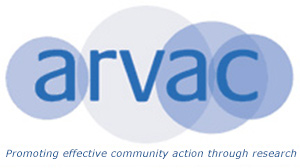ARVAC ROUNDTABLE : Authenticity, Relationships and Community Informed Research and Practice – Key Issues from the discussion on March 27 2005
Context Setting
Two provocations were offered – one framing possible ways of thinking about locality as an organising principle and one which situated the cuts in Adult Learning as a lease through which to explore the ways in which opportunities to participate, engage in and influence local decision making and national questions have been significantly eroded. ( Both of these provocations have been shared here ).
The recent announcements by the UK Government with respect to the Spring Statement and the intention , over time, to reduce social and welfare benefits as well as further structural changes to the NHS were drawn on to illustrate the important changes in public policy which are likely to impact negatively on vulnerable members of the community and their families and friends.
The Discussion
Three key and potentially significant themes emerged – all of which reflected the primary focus of the roundtable : Theme One : Authenticity in practice (by civic institutions or other professionals ) can be contained or restricted by the extent to which those leading or managing initiatives recognise the context of those they are working with and facilitate dialogue and discussion which is based on understanding needs .
The centrality of authenticity in such dialogues informs either by promoting or limiting the ways in which relationships are experienced ( Theme Two ). The roundtable heard important examples where relationships were limited or contained by those working in their localities. At times this might have been lack of resources but often it was because the framing of the relationships was not authentic but rather pragmatic and , therefore, time limited. It was recognised that authentic relationships need time to develop and this requires not just a willingness to work in a particular way but the skills and capacity to do so .
The Third Theme – Community Informed Research and Practice was one approach which over time has had its capacity or rather the capacity of different organisations severely reduced. Cuts in funding and /or changes in funding requirements has led to a real reduction in opportunities to influence decision makers. The importance of Lived Experience was seen as not just another slogan but a much more important way of framing policy and practice questions. Access to services or rather lack -of access gives insights into important practice issues and questions – whose needs have been identified ? Who has been involved in discussions? What’s the evidence base for decisions? And these open up the discussion into how policy is framed and then decided.
These three themes are all indicative of one of the current challenges faced by local groups and those supporting community based and informed research. The cumulative impact of cuts in spending at a local level have , over time , had a direct effect on the capacity of local professionals as well as activists to influence local decision making. At the same time the cuts whilst reducing the capacity , also, make it easier for local decision makers to argue they cannot engage in an informed dialogue. ARVAC’s experience over time and one of the motivating factors behind the setting up of ARVAC in the late 1970s was to build and sustain the capacity of local groups to engage in an evidence led conversation at the local level. ARVAC did not assume (based on experience and evidence) that local decision makers had a bias in favour of dialogue and participation. Building local skills, knowledge and capacity were essential to support local action. This remains the case now – even more so.
